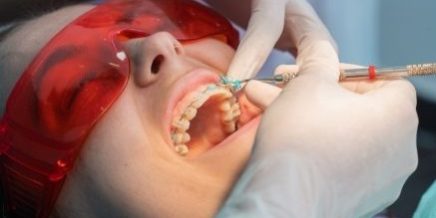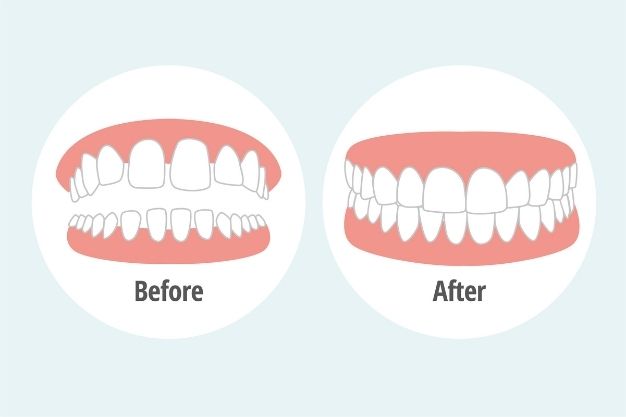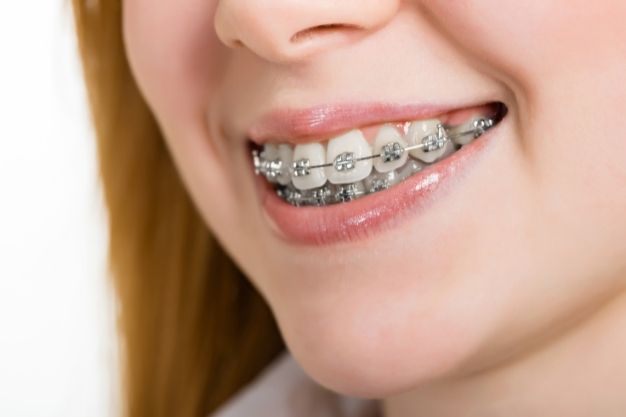If you or your kid has an overbite, you may be considering treatment alternatives. Your orthodontist may propose one of the numerous different methods of therapy. The kind that is most likely to work will be decided by the severity of the overbite and other criteria, such as the underlying reason. Braces are a frequent overbite teeth treatment. Aligners are another option. In this page, we’ll look at the various types of braces you might want to consider and explain why they might or might not be a good option for an overbite.
Overview
Overbite, often known as buck teeth, is a condition in which your top front teeth expand beyond your bottom front teeth. A lot of people have a tiny overbite. A significant overbite can cause tooth decay, gum disease, and jaw discomfort. Limiting thumb-sucking and pacifier use in youngsters can help them avoid developing an overbite.
What exactly is an overbite?
An overbite, commonly known as buck teeth, is a tooth misalignment. You have this condition when your upper front teeth protrude (stick out) beyond your lower front teeth.
An example of malocclusion is an overbite. This word refers to any teeth that are misplaced or crooked.
Overbite Varieties
Overbite is classified into two types:
Overbite of the skeleton:
This is due to uneven jawbone growth, which causes teeth and jaws to grow incorrectly
Dental:
This is due to a halt in dental development caused by an external factor. It might involve tooth loss in the rear, tooth crowding, or poor oral hygiene.
Overbite vs. Overjet
Although they are not the same thing, overbite and overjet are often confused.
There is a horizontal space between the top and bottom front teeth in an overjet. It may not always result in an overbite. Those with an extreme overjet, on the other hand, are likely to have an excessive overbite as well. The overbite teeth treatment from Positive Dental is effective as the experts are following world-class advanced methods without any or less pain.
An expert orthodontist will be able to treat both issues together. If you believe you have an overbite, you should carefully consider orthodontic treatment.
What is the impact of an overbite on the body?
A little overbite may not result in any visible health problems. An untreated overbite, on the other hand, may result in:
- Breathing difficulties
- Chewing difficulty or discomfort
- Periodontal disease
- Temporomandibular disorders or jaw pain (TMD)
- Cavities or tooth decay
- Speech problems
Overjets vs. overbites
Overjet is another phrase used in orthodontics. Some individuals confuse the phrases overjet and overbite. However, while these situations are comparable, they are not the same.
In both circumstances, your upper teeth protrude over or in front of your lower teeth. However, in the case of an overjet, the top teeth protrude over the bottom teeth at an angle.
What factors contribute to an overbite?
An overbite can be inherited in some situations (runs in the family). The alignment of your teeth might be affected by genetic factors such as your jaw shape.
Other factors include:
- Nail-biting is excessive
- Grinding of the teeth (bruxism)
- Thumb-sucking, also known as nonnutritive sucking behavior (NNSB), begins after the age of three
- Tongue-thrusting is a condition in which the tongue presses too far forward into the mouth
- Using a pacifier, particularly beyond the age of three
What are the signs and symptoms of an overbite?
The most noticeable sign of an overbite is that your top front teeth overlap past your bottom front teeth. Overbites can also result in:
- Difficulty opening or shutting the mouth completely
- Uncomfortableness while eating
- Speech difficulties due to jaw discomfort
What are the finest braces for overbites?
Traditional braces are the gold standard for addressing severe overbites and overjets. They can also help to rectify crowded or crooked teeth and a misaligned jaw.
Metal or ceramic braces are used in this type of brace. They are wire-connected to one other and fastened to each tooth. This aligns and straightens misaligned teeth on both sides of the mouth. After the teeth have been straightened, coils, springs, and bands are placed to assist move and positioning the jaw into place.
Traditional braces are normally worn for one to three years and are not detachable at home. Your orthodontist will adjust and tighten your braces as required during this period, which is generally once a month.
Traditional braces provide steady, consistent pressure to teeth over time, gradually moving them into their ideal position. Because conventional braces cannot be removed at home, they are frequently the quickest and most efficient option to address the majority of overbites.
You may need to use a retainer once your braces are removed. According to your orthodontist’s recommendations, this detachable device can be used full-time or solely when sleeping. It is utilized to keep your teeth and jaw aligned so that your overbite does not recur.
What Will Happen If I Do Not Treat It?
An overbite, if left untreated, may lead to chronic health issues. These include irreversible tooth damage from improper alignment and potential jaw discomfort, including temporomandibular joint diseases (TMJ). Overbite teeth treatment at positive dental is preferred by most people as they are safe and secure with minimal pain.
Other overbite issues are as follows:
- Cavities, gum disease, and eroded tooth enamel are all examples of dental decay
- Jaw ache
- Extensive headaches
- While eating, you may experience discomfort or agony.
- Problems completely opening or shutting the mouth
- Obstructive sleep apnea
- Speaking with difficulty
Untreated overbite can also significantly change face anatomy and contribute to psychological difficulties such as poor self-esteem. Suppose the reasons for the overbite began in early childhood and are persistent and severe enough. In that case, cosmetic degeneration will occur as early as pre-pubescence, perhaps leading to peer bullying.
Issues Caused by an Overbite
Did you say out loud that you don’t require overbite treatment? We’ll offer you a few reasons why you should solve it.
Overbite teeth can create a variety of problems, including:
- Impediments to speed
- Having difficulty chewing
- Breathing problems
- Teeth and gum damage
- When biting or chewing, you may experience pain.
- The look of the face has changed
As a result, you must get treatment as soon as possible.
How to Treat an Overbite at Home Without Braces?
Attempting to fix an overbite without braces at home is exceedingly risky and is not advised by any dental expert. Orthodontists train for years to learn the safe movement of teeth: using at-home materials to straighten your teeth can significantly harm them, often permanently. Many thousands of complaints have been filed against at-home aligner manufacturers that attempt to treat your teeth from a kit at home, resulting in irreversible tooth damage.
Don’t skip on your health: contact a certified, competent orthodontist to fix your overbite and gain long-term results and improved health.
Is it Possible to Treat an Overbite Without Seeing an Orthodontist?
No, an orthodontist is essential to correct an overbite safely and successfully. It may require an oral surgeon to repair the overbite in extreme situations. Doing orthodontic therapy at home without expert supervision is extremely risky and can result in catastrophic tooth damage: do not attempt to fix an overbite on your own.
Seeking tele dentistry, like mail-order aligners, without the direct supervision of an in-office orthodontist can potentially result in major unexpected outcomes. As a result, it is time to schedule an appointment at Positive Dental to receive the best dentistry from P. Srujana reddy, well-known for smile design.



